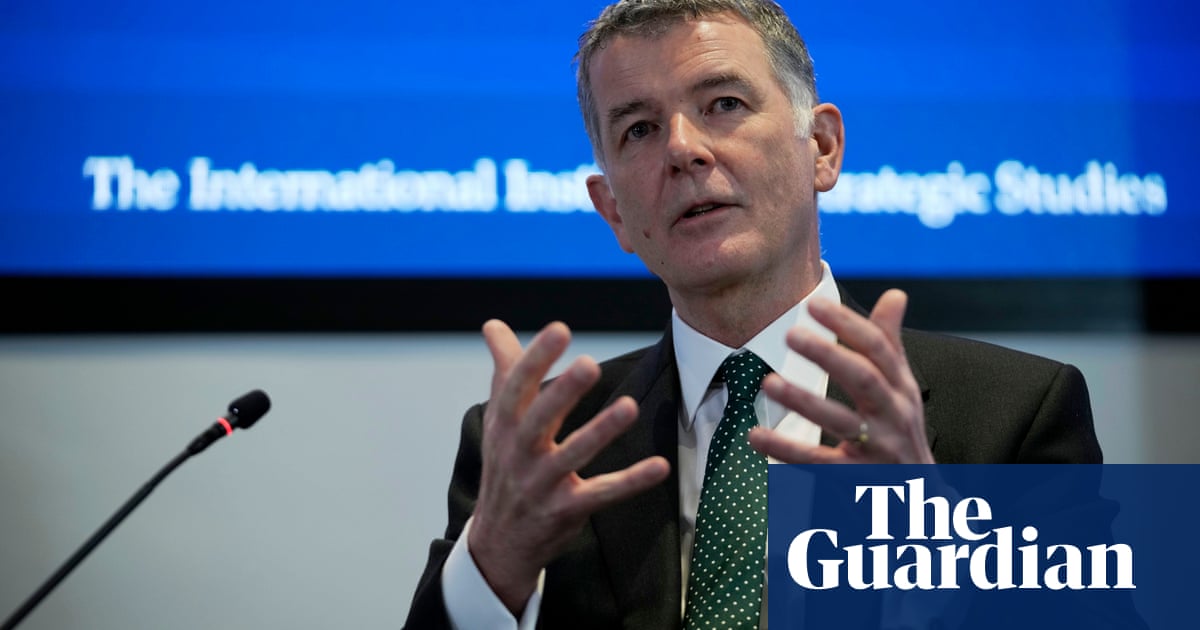Abandoning Ukraine would jeopardise British, European and American security and lead to “infinitely higher” costs in the long term, the head of MI6 has warned in a speech that amounted to a plea to Donald Trump to continue supporting Kyiv.
Richard Moore, giving a rare speech, said he believed Vladimir Putin “would not stop” at Ukraine if he was allowed to subjugate it in any peace talks involving the incoming US Republican administration.
“If Putin is allowed to succeed in reducing Ukraine to a vassal state, he will not stop there. Our security – British, French, European and transatlantic – will be jeopardised,” Moore said during an address given in Paris alongside his French counterpart.
The spy chief was touted earlier this week as a possible surprise appointment as the UK’s ambassador to the US, though he is not thought to be pressing for the job. The former Labour minister Peter Mandelson is considered the frontrunner for a critical role at a delicate time in transatlantic relations.
Moore has served as the head of MI6 for four years in what is normally considered a five-year job. At the start of his tenure he overlapped with the Trump adviser Richard Grenell, who was the acting director of national intelligence.
Trump has complained about the expense of supporting Kyiv and said repeatedly that he wants to end the war, claiming he could do so “within 24 hours”. JD Vance, the vice-president-elect, has suggested freezing the conflict on the current frontlines, and denying Ukraine Nato membership for an extended period.
“The cost of supporting Ukraine is well known,” said Moore. “But the cost of not doing so would be infinitely higher. If Putin succeeds, China would weigh the implications, North Korea would be emboldened and Iran would become still more dangerous.”
A key British argument to the incoming Trump administration is to try to link the war in Ukraine with US concerns about the rising military might of China, emphasising that the arrival of North Korean troops is bringing authoritarianism from Asia into what was previously a European conflict.
Moore emphasised the UK’s history of intelligence cooperation with France in a speech to commemorate the 120th anniversary of the Entente Cordiale, but he was also careful to emphasise that he expected UK-US intelligence cooperation to be unchanged regardless of any political tensions.
“For decades the US-UK intelligence alliance has made our societies safer; I worked successfully with the first Trump administration to advance our shared security and look forward to doing so again,” Moore told his audience at the UK embassy, a short walk from the Élysée Palace, the official home of the French president.
The spy chief’s public presence in the French capital reflects a wider political rapprochement between the British prime minister and the French president. After Trump’s victory, Keir Starmer met Emmanuel Macron in France where the two discussed Ukraine amid reports that the Republicans would like European soldiers to act as peacekeepers if a ceasefire was agreed.
Moore said Putin’s goal was to “challenge western resolve” and that western spy agencies had “recently uncovered a staggeringly reckless campaign of Russian sabotage in Europe” – a reference to a mixture of arson, assassination and kidnap plots, which included a fire at a DHL warehouse in Birmingham caused by an incendiary device hidden in a package sent at the behest of Russia.
Moscow has said its demands regarding Ukraine remain unchanged. Earlier this month, the Kremlin said its full-scale invasion of Ukraine in 2022 was the “direct result” of a Nato policy that aimed at “creating a staging ground against Russia on Ukrainian soil”.
Russia continues to demand “demilitarisation and denazification” of Ukraine, and in previous peace negotiations said Kyiv’s military should be reduced to 50,000. It also claims the territory of four eastern and southern Ukrainian provinces, Donetsk, Kherson, Zaporizhzhia and Luhansk, of which only the fourth is fully occupied.

